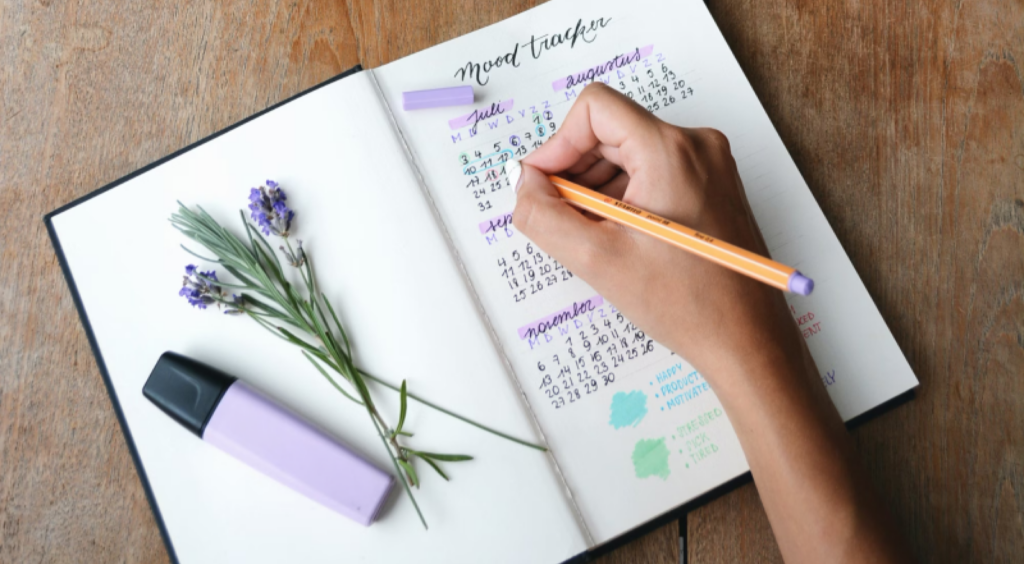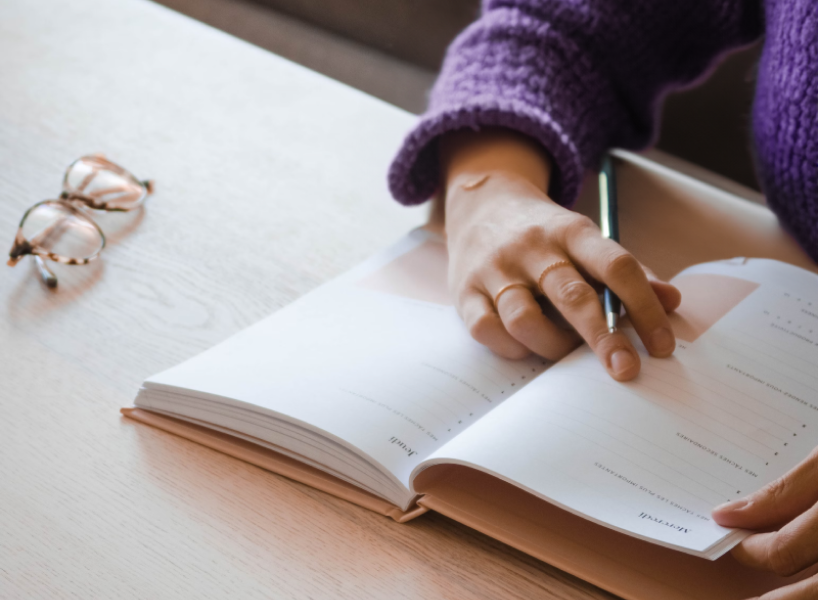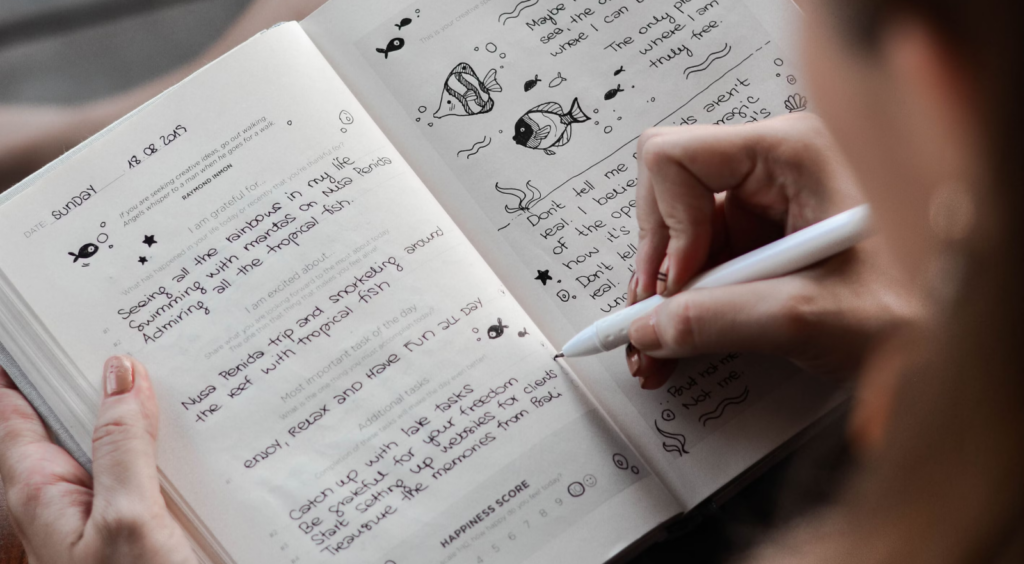Content
How to Write And Keep a Journal: Mastering the Art of Diary Writing
Day journal writing is a timeless practice, offering a personal sanctuary for thoughts, emotions, and experiences. Whether you’re chronicling daily events, expressing your innermost feelings, or reflecting on your journey, mastering the art of journal writing can be both a therapeutic and rewarding endeavor. In this guide, we will explore techniques and tips to enhance your diary-writing skills, helping you create entries that are not only meaningful and reflective but also a true expression of your unique voice.
Discover the power of daily introspection and learn how to turn your diary into a cherished confidant, capturing the essence of your life’s story.

What Is the Purpose of Writing a Day Journal?
Writing a diary serves multiple purposes, each contributing to personal growth and emotional well-being. At its core, it is a method of self-expression, allowing individuals to articulate their thoughts, feelings, and experiences in a private and safe space. This process can be cathartic, helping to release pent-up emotions and reduce stress. By documenting daily events and personal reflections, individuals gain clarity and perspective on their lives, which can lead to improved self-awareness and a deeper understanding of their motivations and behaviors.

Make writing a diary a piece of cake with our powerful writing tools! →
Another significant purpose of writing a day journal is to preserve memories. Diaries serve as personal historical records, capturing moments that might otherwise be forgotten. This can be especially meaningful over time, as rereading past entries allows individuals to reflect on their personal journey, growth, and changes. Furthermore, maintaining a journal can improve writing skills and foster creativity. People who keep a diary often end up as successful journalists or popular book authors. Let’s have a closer look at three main goals.
- Personal Expression and Reflection
Writing a diary allows for personal expression and reflection, giving you a private space to explore your thoughts, feelings, and experiences. By regularly documenting your life, you can better understand yourself, track your growth, and reflect on your journey. This process helps clarify your thoughts and can lead to deeper insights about your life and goals.
- Historical Record and Memory Keeping
A journal serves as a historical record, preserving memories and moments that might otherwise be forgotten. It captures the details of your daily life, significant events, and personal milestones, creating a tangible record for future reference. Over time, your diary can become a valuable keepsake that provides a detailed account of your personal history and evolution.
- Emotional Release and Mental Health Benefits
Keeping a diary offers emotional release and mental health benefits. Writing about your emotions, challenges, and stressors can be therapeutic, helping you to process and manage your feelings. It provides a safe outlet for expressing difficult emotions, reducing anxiety, and promoting overall mental well-being. The act of writing can be calming and grounding, contributing to better mental health.
Picking the Right Medium
In the realm of personal organization and journaling, the debate between traditional paper diaries and digital diaries is a longstanding one. Each medium has its unique advantages and drawbacks, appealing to different preferences and lifestyles. Understanding these differences can help individuals choose the best method for their needs.

Traditional paper diaries
They are cherished for their tactile experience. The physical act of writing with a pen can be meditative, providing a sense of connection and mindfulness that digital methods often lack. Paper diaries do not require batteries or software updates and can be a personal artifact, something tangible to hold and look back on over the years.
However, they are also less convenient in terms of portability and are vulnerable to physical damage or loss.
Digital diaries
They offer unparalleled convenience and versatility. With features like search functions, automatic backups, and cross-device synchronization, digital diaries ensure that entries are easily accessible and secure. They often come with additional functionalities such as reminders, multimedia integration, and cloud storage, which can significantly enhance the journaling experience.

Nevertheless, the reliance on electronic devices and the potential for digital distractions can detract from the reflective nature of diary-keeping.
Below is a comparison table highlighting the key differences between traditional paper diaries and digital diaries:
Feature | Traditional Paper Diaries | Digital Diaries |
|---|---|---|
Tactile Experience | high physical writing is engaging | low typing or tapping on a screen |
Portability | moderate requires carrying the diary | high accessible via multiple devices |
Security | low susceptible to physical damage | high can be encrypted and backed up |
Customization | high personalized with drawings, etc. | moderate limited by app functionalities |
Multimedia Integration | none | high photos, audio, and video entries |
Distraction Level | low focused on writing | high potential for notifications, other apps |
In conclusion, those who value the sensory experience and nostalgia of handwriting may prefer traditional paper diaries. Conversely, those who prioritize convenience, security, and additional functionalities might find digital diaries more suitable. For instance, you can easily come up with a digital journal by just using your voice with our application, transforming that to a written memory, like whispering a secret to a friend. Save the result each time to keep your thoughts safe with us!
Famous People Who Used to Run a Diary
Many distinguished book authors and famous journalists kept diaries. Some of them still do that. Below, you can find a brief list of such people, with some of their lines paraphrased for uniqueness purposes.


Wish to write as good as they do? It’s free, Try it!
Virginia Woolf
Over the past year, I’ve noticed a marked improvement in the flow of my professional writing, which I credit to the relaxed half an hour I spend writing after tea. In addition, I can see the specter of a shape that journaling could take. I hope to figure out what else can be made of this ephemeral, lifeless substance eventually; I’ve already given it a lot more deliberate and careful use in literature, but maybe there’s more to it than that.
From A Writer’s Diary, by Virginia Woolf
Notable works:
- The Voyage Out
- Jacob’s Room
- Mrs. Dalloway
Franz Kafka
The diary provides evidence that you endured circumstances that appear intolerable to us now, lived through them, observed your surroundings, and recorded your observations; that your right hand functioned similarly then as it does now; that we may be wiser now and we can reflect on our previous state; and that is precisely why we must acknowledge the bravery of our earlier endeavors, in which we persevered despite our complete ignorance.”
Franz Kafka’s The Diaries, published between 1910 and 1923
Notable works:
- The Judgement
- In the Penal Colony
- The Metamorphosis
John Steinbeck
Writing tends to favor habit over willpower or creativity. Thus, there must be some fierceness until a certain number of words become habitual. I cannot say, ‘I’ll do it if I feel like it.’ Daily awakening is never enjoyable. The slightest excuse will prevent labor. The rest is gibberish. Maybe some individuals can operate that way, but not me. I must write daily, whether they are excellent or bad.
John Steinbeck, Working Days: The Journals of The Grapes of Wrath
Notable works:
- Tortilla Flat
- The Grapes of Wrath
- Cannery Row
What Types of Diaries Exist?
Aside from personal diaries, what other kinds of journals are there? There are other types of diaries that might serve you well in addition to the traditional one for personal entries.

No matter which type of journal you plan to keep, Memory Hive will ease the process!
Electronic Periodicals
Electronic personal and commercial journals have gained popularity in recent years. For this purpose, creating “My Diary” either on your personal computer desktop or online is sufficient.
There are advantages and disadvantages to this form. An especially useful among the additional capabilities that become available when maintaining electronic records is the ability to delete and rewrite any thought
Keep in mind that your entries may become public property when submitted electronically. This is detrimental not only to personal entries but also to business planners. Such information ought to be maintained with greater care. You have the option to establish a password for access.
Travel Journals
Travel diaries are a cherished method for documenting adventures and preserving the essence of journeys. They offer a personal narrative of experiences, allowing travelers to record their observations, emotions, and interactions in vivid detail. By maintaining a travel journal, individuals can capture the sights, sounds, and smells of new places, creating a rich tapestry of memories that can be revisited long after the journey ends.
Moreover, travel diaries serve as a valuable tool for reflection and inspiration. They enable travelers to process their experiences, gain deeper insights into different cultures, and recognize their own development through the journey. For future trips, these diaries can provide practical insights and tips, enhancing subsequent adventures.
Business Planners
This notebook is an absolute must-have for every businessperson. Meeting reminders, daily agendas, contact information, and more can all be easily organized using this tool. If you’re having trouble keeping track of when you have meetings, you might select dated calendars that have the dates printed in the margins. In essence, it serves as a daily journal.
There are benefits to using an undated planner as well. They are useful for more than just one year; you can use them for two. On the other hand, you can use many pages in a single day. Then you can keep track of anything from work to chores around the house. For keeping an LD (life diary), these choices are ideal.
Other Types of Diaries
Type of Diary | Description | Pros | Cons | Ideal Users |
|---|---|---|---|---|
Bullet Journal | Combines planning, to-do lists, and journaling in a customizable format. | Highly customizable, helps with organization. | Can be complex to set up, requires creativity. | Those who enjoy planning and creativity. |
Gratitude Journal | Focuses on writing down things one is grateful for each day. | Enhances positivity and mindfulness. | Can feel repetitive, may seem overly simplistic. | Individuals seeking to improve mental well-being. |
Dream Journal | Used to record and reflect on dreams experienced during sleep. | Enhances dream recall, useful for dream analysis. | Dreams can be vague, not always memorable. | Those interested in dream analysis or lucid dreaming. |
Food Diary | Tracks daily food intake, recipes, and culinary experiences. | Helps with dietary tracking, improves eating habits. | Requires daily entries, can be tedious. | Individuals monitoring their diet or health. |
Fitness Journal | Logs workouts, fitness goals, and progress. | Motivates fitness goals, tracks progress. | Needs regular updates, can be time-consuming. | Fitness enthusiasts and athletes. |
Health Journal | Records health-related data such as symptoms, medications, and medical visits. | Helps in tracking health, useful for doctors. | Can be detailed, requires regular updates. | Patients with chronic conditions, health-conscious individuals. |
How to Start Keeping a Personal Diary: First Page
Selecting a dedicated time and place for journaling can enhance the experience, making it a cherished routine. Opt for a quiet and comfortable spot, free from distractions, where you feel at ease. This could be a cozy corner of your home, a favorite café, or a peaceful park bench. Consistency is key; choose a time that aligns with your daily schedule, whether it’s early morning, during lunch, or before bed.
Regular writing sessions help establish a habit, allowing your thoughts and feelings to flow more naturally, making your diary a true reflection of your life.

Creating a comfortable journaling environment is essential for fostering creativity and reflection. Start by choosing a quiet, cozy spot free from distractions. This could be a corner of your room with a comfortable chair, soft lighting, and a small table for your diary and writing tools. Personalize the space with items that inspire you, like favorite photos, plants, or scented candles. Ensure good lighting to reduce eye strain and play soft background music if it helps you focus. Below you can see the small list of the best music for writing a diary or a book.
- Classical Music
- Composers: Bach, Mozart, Beethoven
- Reason: Calming and intricate, aids concentration without lyrics.
2. Instrumental Soundtracks
- Examples: The Piano by Michael Nyman, Inception by Hans Zimmer
- Reason: Evokes emotions and sets a mood without distracting words.
3. Lo-fi Hip Hop
- Popular Channels: ChilledCow, Chillhop Music
- Reason: Relaxing beats that create a peaceful atmosphere for
4. Ambient Music
- Artists: Brian Eno, Moby, Tycho
- Reason: Soothing and minimalistic, ideal for maintaining focus.
5. Jazz Instrumentals
- Artists: Miles Davis, John Coltrane, Bill Evans
- Reason: Smooth and rhythmic, helps with a steady writing flow.
6. Nature Sounds
- Types: Rainfall, ocean waves, forest sounds
- Reason: Natural and calming, perfect for creating a serene writing environment.
7. Acoustic Guitar
- Artists: Tommy Emmanuel, Andy McKee, Sungha Jung
- Reason: Gentle melodies that provide a soothing backdrop for creativity.

Keep in mind that there are no specific guidelines for composing the initial page. The filling of your personal journal is entirely up to your discretion, as it is your personal area.
Some individuals engage in freewriting, while others opt for creating cartoons or collaging photographs.
If you are uncertain and desire to ascertain the potential contents of the initial page of your diary, we have devised a universally applicable suggestion for you:
- Title page with the heading like, How I Keep My Personal Diary.
- Specify the start date. You can also describe the weather, your mood, and where you are.
- Write about how you decided to start journaling. Here, it’s better to further describe what kind of experience you would like to gain from writing.
- Briefly formulate the main rules: how often you plan to make entries in your personal journal, what you will write about, etc.
Additionally, an introduction wouldn’t be redundant. In 4-6 sentences, you can address your diary or set long-term goals for yourself.
How to Generate Ideas for Your Day Journal
Keeping a diary can be a fulfilling and introspective activity, but sometimes it’s challenging to come up with fresh ideas to write about. Here are some tips to help you generate ideas for your journal:
- Daily Highlights
Reflect on the most memorable events of your day. It could be a conversation, an accomplishment, or even a simple moment that made you smile.
2. Emotions and Feelings
Write about how you’re feeling and why. This can help you process emotions and gain clarity on what’s influencing your mood.
3. Gratitude Lists
List things you’re grateful for. This practice not only provides content but also fosters a positive mindset.
4. Goals and Dreams
Document your short-term and long-term goals. Writing about your dreams can motivate you and provide a roadmap for your aspirations.
5. Creative Prompts
Use prompts to spark creativity. Prompts like “Describe a perfect day,” or “Write about a person who inspires you,” can lead to insightful entries.
6. Quotes and Reflections
Write about a quote that resonates with you. Reflect on its meaning and how it applies to your life.
7. Books and Media
Discuss a book you’re reading, a movie you’ve watched, or a song that moved you. Write about your thoughts and feelings regarding the media you consume.
8. Challenges and Solutions
Note any challenges you’re facing and brainstorm potential solutions. This can be therapeutic and lead to actionable insights.
9. Travel and Exploration
Describe places you’ve visited or wish to visit. Documenting your experiences and travel dreams can be both enjoyable and inspiring.
10. Personal Growth
Write about your personal development journey. Reflect on lessons learned, skills acquired, and personal milestones.
By incorporating these ideas, your diary can become a rich tapestry of your experiences, thoughts, and growth.
Time to Start Creating Your Journal Entries!
Start your entry with the date and day of the week. This adds context and makes it easier to look back on your entries later. Begin writing by briefly describing your current mood or feelings. This sets the tone and helps you dive deeper into your thoughts.
Next, consider what significant events or thoughts have occupied your mind. Write about these topics in detail. Don’t worry about grammar or spelling; the goal is to express yourself freely. Include sensory details to make your entries more vivid—what did you see, hear, or feel?
If you’re unsure what to write, use prompts or questions to get started. For instance, “What was the highlight of my day?” or “What am I grateful for today?” Over time, these entries will become a cherished record of your personal growth and daily experiences. Remember, the most important aspect of diary writing is honesty and openness with yourself.
Exploring Different Styles of Journaling
Diary writing can take many forms, each offering a unique way to document thoughts, experiences, and emotions. Three popular styles include narrative writing, creative writing and storytelling, and stream of consciousness writing.
Narrative vs. Bullet Points
Narrative journal entries resemble short stories, with complete sentences and detailed descriptions. This style allows for deep reflection and the exploration of emotions and events in a structured format. In contrast, bullet point diaries are concise, highlighting key events and thoughts. This method is efficient for quick entries, making it ideal for those with limited time or for capturing a series of events without delving into extensive detail.
Stream of Consciousness Writing
Stream of consciousness writing captures thoughts as they occur, flowing freely without the constraints of traditional structure. This method mimics the natural flow of thoughts, often resulting in a raw and unfiltered record of the writer’s mind. It’s an excellent way to capture spontaneous emotions and ideas, providing an authentic snapshot of the writer’s inner world.

Does this style appeal to you most? Memory-Hive can help: just speak out loud and let our app capture your thoughts!
Each of these styles offers a different lens through which to view and document life, catering to various preferences and writing habits.
Creative Writing and Storytelling
Creative writing and storytelling in diaries allow for a more imaginative approach. Writers can use fictional elements, characters, and plots to narrate their experiences, blending reality with creativity. This style is perfect for those who enjoy crafting stories and wish to reflect on their lives in a more artistic manner.
The Benefits of Keeping a Journal
Keeping a diary is a timeless practice that offers numerous benefits for mental, emotional, and even physical well-being. Whether you are a student, professional, or simply someone looking to document daily life, here are several key advantages of maintaining a diary:

Mental Health Benefits
- Stress Reduction: Writing about your thoughts and feelings can help relieve stress and anxiety.
- Emotional Clarity: Journaling can provide clarity by helping you process complex emotions and situations.
- Improved Mood: Regularly expressing your thoughts can lead to a more positive outlook on life.
Cognitive Benefits
- Enhanced Memory: Writing things down helps improve memory retention and recall.
- Problem Solving: A diary can serve as a tool for brainstorming and solving personal or professional problems.
- Creativity Boost: Documenting ideas and experiences can spark creativity and inspire new thoughts.
Personal Growth
- Self-Reflection: A diary allows you to reflect on your actions and thoughts, promoting personal growth and self-awareness.
- Goal Setting: Writing down your goals and tracking progress can enhance motivation and commitment.
- Historical Record: Keeping a diary creates a personal historical record that you can look back on to see how far you’ve come.
Physical Health Benefits
- Sleep Improvement: Writing in a diary before bed can help clear your mind, leading to better sleep.
- Health Tracking: Documenting daily habits can help you identify patterns and make healthier lifestyle choices.
- Stress Management: Lower stress levels, achieved through journaling, can lead to better overall physical health.
Incorporating diary-keeping into your daily routine can have profound effects on various aspects of your life, making it a worthwhile and enriching habit.
Recommended Reading: Books on Diary Writing
Here are some recommended books on diary writing, including guides and examples of famous diaries to inspire and guide your own diary-keeping practice:
- “The New Diary: How to Use a Journal for Self-Guidance and Expanded Creativity” by Tristine Rainer
This comprehensive guide explores various diary-keeping techniques, including self-reflection, creativity enhancement, and emotional expression.
2. “Writing Down Your Soul: How to Activate and Listen to the Extraordinary Voice Within” by Janet Conner
This book delves into the practice of deep journaling, focusing on connecting with your inner self and finding clarity through writing.
3. “The Artist’s Way: A Spiritual Path to Higher Creativity” by Julia Cameron
While not exclusively about diary writing, this classic book includes “Morning Pages,” a daily writing practice that helps unlock creativity and self-awareness.
4. “Journal to the Self: Twenty-Two Paths to Personal Growth – Open the Door to Self-Understanding by Writing, Reading, and Creating a Journal of Your Life” by Kathleen Adams
This book offers practical advice and exercises to help you start and maintain a journal, with a focus on personal growth and self-understanding.
5. “Leaving a Trace: On Keeping a Journal” by Alexandra Johnson
This guide provides insights and inspiration for keeping a journal, with tips on how to make your diary a meaningful and creative outlet.
6. “The Bullet Journal Method: Track the Past, Order the Present, Design the Future” by Ryder Carroll
This book introduces the Bullet Journal method, a flexible system for organizing your life through diary entries and to-do lists.
7. “The Diary of a Young Girl” by Anne Frank
Anne Frank’s diary is one of the most famous and poignant personal accounts of World War II, providing a moving example of diary writing under extraordinary circumstances.
8. “The Journals of Sylvia Plath” edited by Karen V. Kukil
Sylvia Plath’s diaries offer an intimate look into the mind of the renowned poet and novelist, showcasing the power of personal writing.